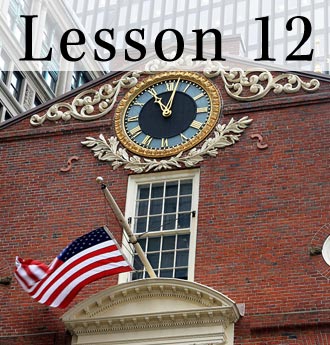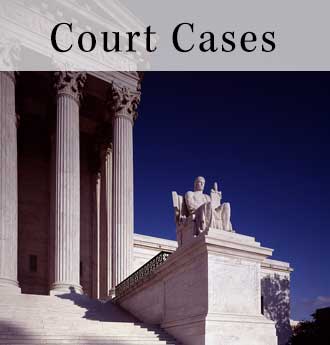Lesson 12: How Did the Delegates Distribute Powers between National and State Governments?
What powers does the Constitution give the national government over state governments and the people? (Video)
Delegates concerns about states not fulfilling obligations, not paying war debts, fomenting conflict among themselves, erecting trade barriers between themselves, and internal insurrections, such as Shays' Rebellion. National government powers over states, such as control of the militia to suppress insurrections and repel invasions, supremacy Clause. Limits on national government powers, such as habeas corpus, ex post facto laws, bills of attainder, right to trial in criminal case, religious tests for public office. Limits on state governments, e.g., cannot coin money, cannot make treaties.
Student Questions: Unit 2, Lesson 12, Sections 1-3 (pdf download)
What provisions of the Constitution deal with slavery? (Video)
Terms slave and slavery not used in Constitution; nationwide existence of slavery; Three-Fifths Compromise; Fugitive Slave Clause; slavery a state institution, not a national institution; no ban on importation of slaves until after 1808.
What issues were not addressed at the Philadelphia Convention? (Video)
"Citizen" not defined; issue of free African-Americans; eligibility for voting; how checks and balances would work; relationship between president and Congress; Fourteenth Amendment.
Adam Walsh Act And Ex Post Facto (Video)
How the Adam Walsh Act violates the Ex Post Facto clause of the US Constitution.
A New System of Government (Video)
In A New System of Government, video 5 of the Biography of America series, Professor Pauline Maier discusses the creation of the Constitution. Produced by WGBH Boston in cooperation with the Library of Congress and the National Archives and Records Administration, and with the assistance of Instructional Resources Corporation. From Annenberg Media's Learner.org website.
War Powers and Covert Action (Video)
In War Powers and Covert Action, video 2 of the The Constitution: The Delicate Balance video series, Gerald Ford, Bobby Inman and Edmund Muskie debate presidential war powers. Produced by Columbia University Seminars on Media and Society. From Annenberg Media's Lerner.org website.
60-Second Civics, Episode 335: National and State Powers (Audio)
The relationship between national and state powers.
60-Second Civics, Episode 336: Concerns About State Governments (Audio)
Concerns about the power of state governments.
60-Second Civics, Episode 337: Powers of the National Government, Part 1 (Audio)
Powers of the national government over the states.
60-Second Civics, Episode 338: Powers of the National Government, Part 2 (Audio)
Continued discussion of the powers of the national government over the states.
60-Second Civics, Episode 339: Limitations on the National Government (Audio)
Limits on the power of the national government.
60-Second Civics, Episode 340: Habeas Corpus (Audio)
Habeas corpus and other protections of individual rights.
60-Second Civics, Episode 341: Ex Post Facto Laws and Bills of Attainder (Audio)
A discussion of ex post facto laws and bills of attainder.
60-Second Civics, Episode 342: Political Independence of Public Officials (Audio)
The constitutional provisions for the political independence of public officials.
60-Second Civics, Episode 343: More Protections of Political Independence (Audio)
Continued discussion of the political independence of public officials.
60-Second Civics, Episode 344: Limits on State Powers (Audio)
Constitutional limits on the power of state governments.
60-Second Civics, Episode 345: Slavery and the Constitution, Part 1 (Audio)
How slavery affected state and national powers.
60-Second Civics, Episode 346: Slavery and the Constitution, Part 2 (Audio)
Continued discussion of how slavery affected state and national powers.
60-Second Civics, Episode 347: Slavery and the Constitution, Part 3 (Audio)
More continued discussion of how slavery affected state and national powers.
60-Second Civics, Episode 348: Slavery and the Constitution, Part 4 (Audio)
The conclusion to a discussion of slavery and the Constitution.
60-Second Civics, Episode 349: Issues Unaddressed by the Constitutional Conventi (Audio)
Some issues that were not addressed at the Constitutional Convention.
60-Second Civics, Episode 350: The Constitution and Voting Rights (Audio)
A discussion on the Constitution and voting rights.
60-Second Civics, Episode 351: Representation in the House of Representatives (Audio)
The Framer's debates over suffrage in Congress.
60-Second Civics, Episode 352: National Versus State Power (Audio)
A discussion of conflicts between state and national power.







